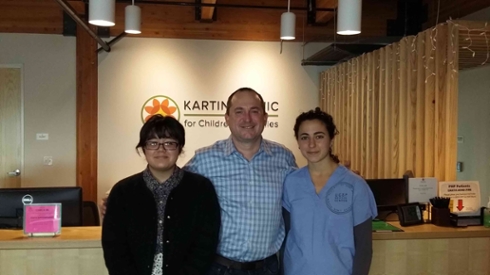Tags
"pediatrics"
Kartini Clinic for Pediatric Eating Disorders: Alicia Molina, Winter Shadow 2016

For the first two weeks of January, I had the opportunity to intern at the Kartini Clinic in Portland. I applied to this internship because it had somewhat to do with my major, and I had never been in a healthcare setting. I was curious how my skills applied to a pediatric eating disorder program and wanted to be a part of something that helps children and their families through this process. My sponsor was Morgan who is a Reed alumnus from 1994. I worked closely with him and Megan, who is head of the Business Office at the clinic. In this internship, I input data, analyzed it, and gave a presentation on my findings.
I was first of all very surprised with how much I was allowed to do. It was way more hands on than I was expecting which was a definite plus. As it was the beginning of the new year and December’s data had not been completely submitted, I started off with raw data entry. I thought my work would end there, but I was presented with possible questions about our patients that I could analyze. My first day there, I was able to participate in a finance meeting that went over revenue and expenses for 2015.
My primary job was to analyze patient data with regard to age, gender, and type of insurance for a nine-month period. Then, I came up with estimates on the average revenue of patient, average length of stay, and average revenue based on insurance. I worked closely with Megan in regards to the specifics of my analysis. We regularly checked in with one another both in person and though email. When she went to work off-site, we discussed the materials that I should look into the day prior so that I wouldn’t run out of things to do.
Kartini Clinic for Pediatric Eating Disorders: Mitra Shokat, Winter Shadow 2016

Kartini Clinic is a small health clinic in Northeast Portland that offers treatment for pediatric patients with eating disorders. Kartini’s approach to eating disorder treatment differs in many ways from that of other facilities. The clinic’s treatment program is family-based and places an emphasis on eating disorders as genetic metabolic disorders instead of psychiatric disorders. In the past year, Kartini Clinic has even implemented individualized genetic testing as a part of their treatment process.
Upon intake, Kartini Clinic patients, ranging in age from 6 to 23 years old, are placed in one of the clinic’s three stages of treatment: the partial hospitalization program, the intensive outpatient program, or the outpatient program. During my two weeks shadowing one of the clinic’s medical assistants, I was given the chance to observe all three levels of treatment. However, I primarily interacted with patients in the partial hospitalization program, taking vitals each morning and occasionally eating meals with them. I learned some incredibly useful skills over the course of those two weeks, including how to take blood pressure manually, how to analyze urine samples, and how to recognize abnormal levels in certain vital measurements.
During my time at Kartini Clinic, I also conducted research. I was responsible for collecting data on the initial diagnoses and intake medications of one hundred of the clinic’s most severe patients. This data will later be compared to the results of genetic testing for those patients. This genetic testing, conducted by a company called Genomind, gives the doctors at Kartini Clinic information about specific mutations that are commonly associated with negative reactions to certain psychoactive drugs. This type of information is invaluable to the doctors, as they often prescribe psychoactive drugs to combat the anxiety and depression that often accompany eating disorders. The goal of our research is to observe any correlations between the results from this genetic testing and the severity of the patient.
